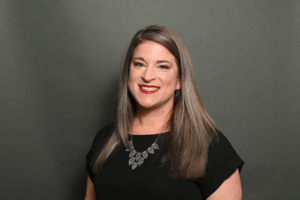
Hi there! Are you struggling with being stressed in healthcare? Are you tired of being tired? You are not alone. Likely you are experiencing burn-out.
Burn-out is included (believe it or not) in the World Health Organization’s ICD-11 as an occupational phenomenon.
Burn-out is defined as “a syndrome conceptualized as resulting from chronic workplace stress that has not been successfully managed. It is characterized by three dimensions: feelings of energy depletion or exhaustion, increased mental distance from one’s job or feelings of negativism or cynicism related to one’s job, and reduced professional efficacy”.
My name is Sarah Voegtle, MS, RD, CSSD, LDN. I have been a dietitian for over 10 years and in the renal realm for around 5 years. I have a 6-month-old and a 3-year-old and I know what it means to be burned out and tired. I transitioned to my position at Patient Care America from working with Davita as a renal dietitian in August 2020, just a couple months after the whole world stood on it’s head with COVID-19. Unfortunately, I’ve seen healthcare professionals leaving clinical roles in waves ever since. The onset of the pandemic almost three years ago (I can’t believe it’s been that long) has created even more
burn-out in healthcare professionals than before for several reasons.
- Patient census is up! A lot of people are still flooding into dialysis facilities with AKIs due to COVID; that coupled with the folks that were already likely to end up in your chair has exacerbated your workload.
- Patients are “sicker”! Because of the pandemic, in many facilities, patients are no longer allowed to eat/drink on treatment. Patients are being more careful about going to the grocery store which has increased food insecurity and access to renal-friendly foods. Also, patients who have had Covid-19 are generally more malnourished. All these things increase the burden on clinicians to create interventions to improve outcomes for their patients.
- Your fellow clinicians are leaving…so that means you must cover for them and often don’t get any financial compensation for it!
- Other teammates are leaving, so your staff is stressed out and stretched thin, which often translates into unhappy people. Negativity begets negativity.
Why is Burn-out so bad?
Easily put, you suffer and when you suffer your patients also suffer.
Burn-out for the clinician is not only a feeling of stress and exhaustion in your day-to-day tasks at work and at home, but it also affects a lot of cognitive areas of functioning. Much research has shown that burn-out can change the brain shape and some of the connections between different parts of the brain. This change can lead to:
- A reduction in working memory
- An inability to plan
- Reduction in focus
- Limited ability to multi-task
- Limited emotional regulation
- Increase our likelihood to respond negatively to stressors
- Increase the risk for anxiety and depression
All these negative implications to burn-out can further lead to reduced sleep, higher incidence of illness and ultimately premature death. Burn-out is real and it is literally killing us.
As for the implications of your burn-out on your patients, a recently published study concluded that 45% of dietitians are unable to carry out the nutritional counseling components of the KDOQI guidelines to their patients. What this means is that because dietitians are stretched so thin, between patient loads and administrative tasks, they are unable to fully do what all the evidence-based guidelines say that they should do. The implications to this are mind blowing, specifically to the ultimate risk of mortality to the patient.
Evidence suggests that dietitians have a key role in eliminating protein energy malnutrition (PEM). Research tells us that if dietitians had just 30 minutes more to speak to their patients, it would create a statistically significant reduction in hospitalizations. Why, might you ask? Well, patients learn how to eat better for their comorbidities by interacting with and speaking to a dietitian; also, if that doesn’t work, RDs are generally able to help patients in other ways like obtaining affordable protein sources. We know that even a +0.1 mg/DL improvement in albumin in just 25% of patients could reduce hospitalizations by over 2,000 and save around 15 million healthcare dollars a year.
How do we beat the Burn out?
For the dietitian:
- Set boundaries and be an advocate for yourself. Unfortunately, many healthcare workers have been inundated with increased patient census with no plan in sight on how to mitigate the issue. Be sure to be a voice for yourself and for your patients. Make sure that your management chain knows the importance of quality healthcare for your patients and how you’re feeling with your current load of work.
- Maintain a work/life balance. Most of us are passionate about our jobs, but your brain health and cognitive function needs to be maintained for you to do all the things that you need and want to do outside of work!
- Give yourself a pep talk! It might sound weird, but it works! Your brain CAN change through neuroplasticity with repeating certain mantras.
I, personally, have different alarms on my phone different times of the day that have positive messages that pop up. You can also start your or end your day with something similar or hang sticky notes with affirming messages to remind yourself that you’re awesome and you got this!
- Practice mindfulness! In research, relaxation has shown to reverse some of the cognitive effects that burn out has burdened healthcare workers with. There are many resources to help you practice mindfulness whether it be using apps, YouTube channels or doing a general search online. Set a time, daily, to bless yourself with mindfulness.
- Find a way to positively cope! Whether it is exercise/yoga, stress management techniques, brain training puzzles, meditation or just reading a book; make a list of the things that you enjoy doing that relax you and start making time to incorporate these things into your daily life.
- Work on improving your resilience. It’s okay to fall down but try to work on how quickly you can get back up. A couple of things that researchers suggest include building strong and positive relationships with people around you, finding meaning in your day, learning from your mistakes, maintaining hope, being proactive with problem solving and, of course, taking care of yourself.
For the patients
- This may be redundant but do everything I said above. You can’t take care of anyone else until you start taking care of yourself!
- Ask for help. If you need a colleague to step in and help with something, ASK!
- Lean on us. As I stated before, dietitians are responsible for a lot in patient care and the implications of being stretched too thin and not being able to properly address PEM in patients can literally be deadly. Here at Patient Care America, we are here for you to help you with anything you need.
-
- Check out our wonderful patient education tools at pcacorp.com
- Stay up to date with the latest information regarding renal nutrition, while obtaining continuing education credit by attending our FREE monthly webinars. You can register for these on our website: pcacorp.com
- You can also contact your Nutrition Therapy Consultant to make sure you are being alerted to these monthly opportunities whether by phone call, text message or email.
- Let us help you identify your patients that are at high risk for PEM and walk you through the easy referral process to start your patients on IDPN or IPN therapies so that those patients don’t fall through the cracks.
Thank you to our guest blogger, Sarah Voegtle, MS, RD, CSSD, LDN for sharing her expertise and patient experience for this blog post.

